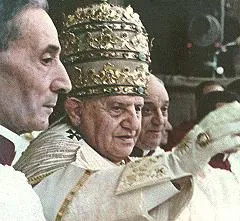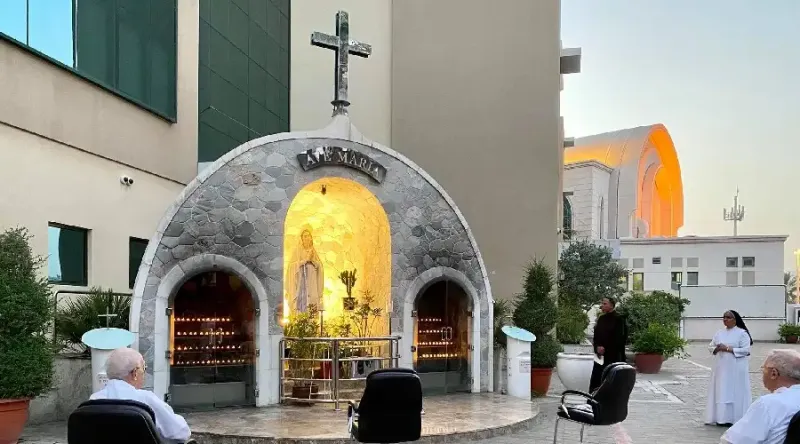
St. Louis, Mo., Oct 11, 2022 / 14:00 pm (CNA).
St. John XXIII, who led the Catholic Church from 1958 until his death in 1963, called for and opened the Second Vatican Council, commonly known as Vatican II, with the aim of responding to the challenges of the day and finding new ways and a new “energy” to proclaim the Gospel to all people.
Vatican II, St. John XXIII said, “musters the Church’s best energies and studies with all earnestness how to have the message of salvation more readily welcomed by men.”
There have been 21 ecumenical councils in the Church’s history at which, according to the Catechism of the Catholic Church, “the college of bishops exercises power over the universal Church in a solemn manner.” Vatican II was the first council held in nearly a century — Vatican I was convened in 1868, also in response to the most challenging ideologies of its day.
Vatican II’s council fathers, in four sessions attended by thousands of priests, religious, and lay people, produced 16 documents that continue to shape the Catholic Church today.
Here are some quotes from John XXIII’s opening speech to the Second Vatican Council, delivered 60 years ago today. (Note that the pope, as was the custom of the day, refers to himself using the “royal we.” The English translation of the speech was obtained here.)
- St. John XXIII called the council in order to respond to the “errors, needs, and opportunities” of the world of the 1960s.
“The present council is a special, worldwide manifestation by the Church of her teaching office, exercised in taking account of the errors, needs, and opportunities of our day.”
“The Church has always opposed these errors, and often condemned them with the utmost severity. Today, however, Christ’s Bride prefers the balm of mercy to the arm of severity. She believes that present needs are best served by explaining more fully the purport of her doctrines, rather than by publishing condemnations.”
- Problems and difficulties in life are common to all mankind.
“Certain it is that the critical issues, the thorny problems that wait upon men’s solution, have remained the same for almost 20 centuries. And why? Because the whole of history and of life hinges on the person of Jesus Christ. Either men anchor themselves on him and his Church, and thus enjoy the blessings of light and joy, right order and peace; or they live their lives apart from him; many positively oppose him, and deliberately exclude themselves from the Church. The result can only be confusion in their lives, bitterness in their relations with one another, and the savage threat of war.”
- In light of the difficulties of modern life, the truth of Catholicism is needed.
“[T]he function of every ecumenical council has always been to make a solemn proclamation of the union that exists between Christ and his Church; to diffuse the light of truth; to give right guidance to men both as individuals and as members of a family and a society; to evoke and strengthen their spiritual resources; and to set their minds continually on those higher values which are genuine and unfailing.”
“The major interest of the ecumenical council is this: that the sacred heritage of Christian truth be safeguarded and expounded with greater efficacy.”
- The council was not a rejection of past tradition…
“The voice of the past is both spirited and heartening. We remember with joy those early popes and their more recent successors to whom we owe so much … Their uninterrupted witness, so zealously given, proclaims the triumph of Christ’s Church, that divine and human society which derives from its divine Redeemer its title, its gifts of grace, its whole dynamic force.”
- …but rather an attempt to proclaim the Christ’s truth with a new “energy.”
“We have every confidence that the Church, in the light of this council, will gain in spiritual riches. New sources of energy will be opened to her, enabling her to face the future without fear. By introducing timely changes and a prudent system of mutual cooperation, we intend that the Church shall really succeed in bringing men, families, and nations to the appreciation of supernatural values.”
“What is needed at the present time is a new enthusiasm, a new joy and serenity of mind in the unreserved acceptance by all of the entire Christian faith, without forfeiting that accuracy and precision in its presentation which characterized the proceedings of the Council of Trent and the First Vatican Council. What is needed, and what everyone imbued with a truly Christian, Catholic, and apostolic spirit craves today, is that this doctrine shall be more widely known, more deeply understood, and more penetrating in its effects on men’s moral lives. What is needed is that this certain and immutable doctrine, to which the faithful owe obedience, be studied afresh and reformulated in contemporary terms. For this deposit of faith, or truths which are contained in our time-honored teaching is one thing; the manner in which these truths are set forth (with their meaning preserved intact) is something else.”
- The Church does not reject science or advances in knowledge, but all human striving should be done with eternity in mind.
“[A]ll men without exception, both individually and in society, have a lifelong obligation to strive after heavenly values through the right use of the things of this earth. These temporal goods must be used in such a way as not to jeopardize eternal happiness.”
“Real [scientific] progress must not be impeded by a passing infatuation for transient things.”
- The Catholic Church’s teaching should be proclaimed to all and not kept hidden.
“[The Church’s teaching] is a treasure of incalculable worth, not indeed coveted by all, but available to all men of goodwill. And our duty is not just to guard this treasure, as though it were some museum-piece and we the curators, but earnestly and fearlessly to dedicate ourselves to the work that needs to be done in this modern age of ours, pursuing the path which the Church has followed for almost 20 centuries.”
“The great desire, therefore, of the Catholic Church in raising aloft at this council the torch of truth is to show herself to the world as the loving mother of all mankind; gentle, patient, and full of tenderness and sympathy for her separated children. To the human race oppressed by so many difficulties, she says what Peter once said to the poor man who begged an alms: ‘Silver and gold I have none; but what I have, that I give thee. In the name of Jesus Christ of Nazareth, arise and walk.’”
- Christ, through his Church, offers eternal happiness to all.
“[I]t is not corruptible wealth, nor the promise of earthly happiness, that the Church offers the world today, but the gifts of divine grace which, since they raise men up to the dignity of being sons of God, are powerful assistance and support for the living of a more fully human life. She unseals the fountains of her life-giving doctrine, so that men, illumined by the light of Christ, will understand their true nature and dignity and purpose.”
- Christ desires unity for his Church, and for all people.
“[I]f we consider well the unity for which Christ prayed on behalf of his Church, it would seem to shine, as it were, with a threefold ray of supernatural, saving light. There is first of all that unity of Catholics among themselves which must always be kept steadfast and exemplary. There is also a unity of prayer and ardent longing prompting Christians separated from this Apostolic See to aspire to union with us. And finally there is a unity, which consists in the esteem and respect shown for the Catholic Church by members of various non-Christian religions.”
- God has a plan.
“Present indications are that the human family is on the threshold of a new era. We must recognize here the hand of God, who, as the years roll by, is ever directing men’s efforts, whether they realize it or not, towards the fulfillment of the inscrutable designs of his providence, wisely arranging everything, even adverse human fortune, for the Church’s good.”
If you value the news and views Catholic World Report provides, please consider donating to support our efforts. Your contribution will help us continue to make CWR available to all readers worldwide for free, without a subscription. Thank you for your generosity!
Click here for more information on donating to CWR. Click here to sign up for our newsletter.





When freemasons infiltrate an organisation they do not say “Hello, we have come to dilute and liquidate.”
Jesus tells us to judge a tree by its fruits, not by its stated intentions.
The fruits of Roncali’s election cry for vengeance.